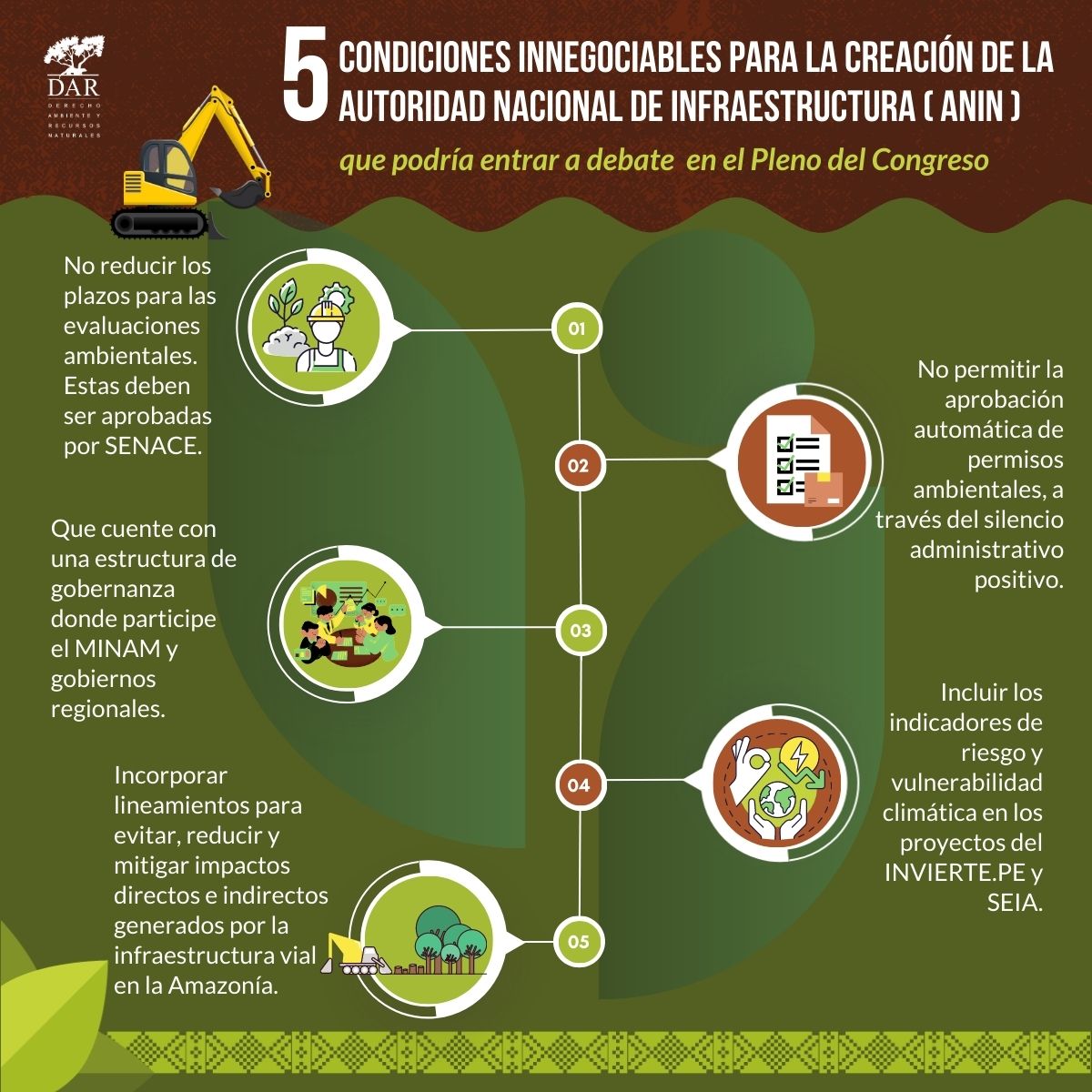The Congressional Committee on Decentralization, Regionalization, Local Governments and Modernization of State Management of Congress
approved
on Wednesday, June 14 the
favorable opinion
favorable opinion on Bill N° 4642/2022-PE, which proposes the creation of the National Infrastructure Authority (ANI).. According to the chairwoman of this Commission, this initiative would address the
«problem of low effectiveness and efficiency in the area of large infrastructure investment projects.
«.
However, such an opinion is cause for concern because it would promote the flexibility of the environmental management system by reducing the deadlines for environmental evaluations; the generation of automatic approvals; and the risk of duplication of functions with regional governments, by creating an authority that would execute infrastructure projects that would correspond to them territorially.
No environmental deadlines
The regulation would aggravate the weakening of the National Environmental Impact Assessment System (SEIA) with a disproportionate reduction of the deadlines for the evaluation of environmental management instruments to 30 working days, which is unfeasible due to the complexity of the projects and/or programs that require a semi-detailed or detailed Environmental Impact Assessment (EIA), which according to the SEIA ranges from 60 to 120 days. (Article 10.4 of the Opinion).
It is worth mentioning that, in addition, with the Legislative Decree No. 1553 The environmental assessment has been made more flexible until December 2024, including the splitting of the environmental assessment of projects, allowing such assessment to be carried out by project sections, which does not consider the integral impact that the entire investment project would cause.
Without SENACE approval
The Opinion eliminates the current SEIA requirement for environmental certification. approved for projects and/or programs, which, with the creation of the ANIN, could be initiated only with an environmental management instrument. evaluated by SENACE during the period of the preparation of the technical file or similar. (Article 10.4 of the Opinion). This would undermine the environmental sustainability of the project to be carried out.
No automatic authorizations
The introduction of positive administrative silence for authorizations for clearing and use of water for projects subject to SEIA (Article 10.1 of the Opinion) would contravene the Administrative Procedures Law, which establishes the application of negative silence in cases that may significantly affect the public interest related to health, environment and natural resources.
Without prior consultation
The lowering of environmental standards in the standard would limit the implementation of mechanisms to protect the collective rights of indigenous peoples. In this context, the State would not comply with the Supreme Court of Justice Ruling No. 29126-2018 LIMA, which establishes the obligation to develop prior, free and informed consultation processes in public services, such as road construction. In addition, this legislative measure should be subject to prior, free and informed consultation with indigenous peoples, in accordance with Law No. 29785, which regulates this right.
Headless
The opinion eliminates the ANIN’s Board of Directors (Article 6 of the PL) and does not establish a special mechanism for coordination with the SEIA and MINAM, in its capacity as the governing body of the SEIA, a concern expressed by the Ministry of the Environment.
Ministry of the Environment
and the
Ombudsman’s Office
in its opinion reports sent to the Bill. The proposed governance structure should also consider the participation of regional governments.
Two authorities at the same time
It should be recalled that this proposal was presented in the context of the emergency caused by cyclone Yaku, stating that the ANIN would replace the Authority for Reconstruction with Change (ARCC)However, the opinion does not consider the absorption of the ARCC by the ANIN, which would result in two public entities linked to infrastructure projects and/or programs.
Along these lines, while the ANIN is assigned «facilities for the execution of projects or investment programs of the National Infrastructure Authority» (Articles 10 to 12 of the Opinion); with the ARCC, the regional and local governments would have the regular procedures.
Minimum considerations to be included in the ANI
In line with the
DAR Legal Analysis
on the Opinion of the Bill N° 4642/2022-PE:
- It should not reduce the deadlines for the evaluation of environmental management instruments or establish positive administrative silence for infrastructure projects and/or programs.
- Must have environmental certification prior to the approval and execution of infrastructure projects and/or programs.without establishing exceptions to compliance with the environmental regulatory framework.
- You must establish a mechanism for broad and timely participation of MINAM and GORE in strategic planning and decision making by the ANIN to ensure environmental sustainability and territorial development that responds to regional and local needs, either in a Board of Directors or another instance in the governance structure of the entity.
- Include guidelines to avoid, reduce and mitigate direct and indirect impacts generated by road infrastructure in the Amazon.. The need for the transportation and environmental sectors to prepare guidelines to address the impacts caused by the design and execution of road projects in the Amazon in public investment projects subject to the Invierte.pe and SEIA should be included as part of the regulatory body of the bill.
- Incorporate risk and climate vulnerability indicators in Invierte.pe and SEIA projects, in accordance with the provisions of the Framework Law on Climate Change and its Regulations. The bill should include a provision stating that projects prioritized by the ANIN must first comply with the incorporation of the climate risk and vulnerability analysis, in accordance with national climate regulations.
- Implement a process of prior legislative consultation for Bill 4642, given the high risk of violation of the collective rights of indigenous peoples implied by its approval and implementation.
- Avoid duplication of functions and public expenditure with the permanence of the ARCC at the same level as the ANIN.


